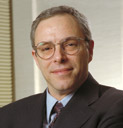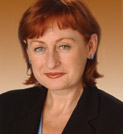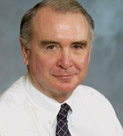The ABCs of CEOs (Page 3)
Marc Chouinard, MBA'82
President and Chief Operating Officer
The Bay

One would think that Marc Chouinard has an enviable advantage as his stores go to war against the likes of Wal-Mart for the Canadian consumer's dollar. After all, Chouinard heads up the Bay, Canada's oldest and best-known chain of department stores. For Canadians, as the ad jingle once declared, "It's hard not to think of the Bay."
Since the Hudson's Bay Company opened its first department store in Winnipeg in 1881 (the department store division was officially christened "the Bay" in 1965), the stores have seemed as quintessentially Canadian as snowball fights and Anne Murray. But, according to Chouinard, banking on patriotism as a strategy for luring shoppers into your stores is a strategy doomed to failure in this globalized age. Anyone remember eaton's?
"Canadians will seek the best value available," says Chouinard. "If everything else is completely equal, which is never the case, maybe they will favour a Canadian company over a non-Canadian. Frankly, planning on being Canadian to be any kind of differentiation would be a very high-risk strategy."
Instead, Chouinard is trying to make his 100 Bay stores distinctive for something else entirely - stylish fashions and designs at reasonable prices. He helped spearhead the creation of several Bay-specific in-house brands dedicated to these principles (Market Design, ToGo, Mantles, Global Mind).
Chouinard figures the biggest success of his management team so far has been in "the transformation of our brand from a promotional, undifferentiated department store chain to a brand that Canadians can count on to provide stylish and exclusive product at affordable prices every day."
What is the best part of your job?
The people I work with and the opportunity I have in making them successful.
What is the worst part of your job?
I tend to delegate things I don't like doing, so I really don't have a worst part.
What are some of the biggest challenges facing
companies in your industry?
In retailing, you have to constantly reinvent yourself, because there is so much competition trying to capture a share of a fairly static Canadian consumer's
wallet. We really have to adopt the philosophy that if it's not broken, fix it
anyway, because it will be broken pretty soon. The life cycle of a good retail
concept is very short and seems to be getting shorter all the time.
What is the biggest misconception about CEOs and the work they do?
That our jobs are stressful.
What is the most important skill for a CEO to have?
Leadership.
What are your hobbies?
Travel, and I like to shop, which is why I joined retailing in the first place.
What is your all-time favourite comedy?
A Fish Called Wanda.
Donna Hayes, BA'78
President, Publisher and CEO
Harlequin Enterprises

Want a stat that will knock you off your chair? Last year Harlequin sold more than 160 million books worldwide - that averages out to more than five books being sold every second!
A subsidiary of the Torstar Corporation, Harlequin, of course, specializes in romance novels. There must be a lot of people looking for love in their literature. According to Maclean's, Harlequin is the most profitable publisher in Canada and among the most successful on the planet.
That's still not good enough for CEO Donna Hayes. "Our vision is world domination of women's fiction," she explains. "We currently have roughly seven percent of the women's fiction market. We want to see that become a lot bigger."
To that end, Hayes is leading Harlequin into new terrain - fantasy novels, Alias-type adventures, steamier romances, edgier "chick lit" aimed at younger readers.
"We want to make sure that any time a woman picks up a fiction title to read, she can find one of ours that will be perfect."
What is the best part of your job?
The people! I work with incredibly talented, fun people every day, so it's a pleasure to come to work.
What is the worst part of your job?
I like it so much it's kind of difficult to achieve any kind of balance in the rest of my life.

What is the biggest misconception about CEOs and the work they do?
That they do it alone. You can't be much of a leader unless you have followers - and that's
a voluntary position.
What is the biggest challenge facing your company today?
How to make our books as relevant to customers in the next 50 years as they have been for the past 50.
If you weren't in publishing, what would you be doing for a living right now?
I can't imagine.
What are your hobbies?
Reading, reading and reading.
What is your all-time favourite comedy?
Monty Python and the Holy Grail.
Rob Ritchie, BSc'67
President and Chief Operating Officer
Canadian Pacific Railway

Rob Ritchie's company helped build Canada. Canadian Pacific Railway, founded in 1881, completed Canada's first cross-country rail link in 1885, uniting the country and opening up the then sparsely populated Canadian West to settlement.
These days, CPR boasts a 14,000-mile rail network in Canada and the U.S. and specializes in bulk freight transportation, annually shipping tons of grain, coal, lumber, petrochemicals and other commodities.
For his part, Ritchie has been receiving kudos for his management of the corporation, recently earning the title of "2004 Railroader of the Year" from railroad industry trade journal Railway Age. "Canadian Pacific Railway is among the best-run of North America's largest freight railroads," declared Railway Age editor William C. Vantuono.
While train transportation might seem downright old-fashioned to some in this high-tech era, Ritchie is quick to assert that "the railway is and will continue to be the most efficient way of moving goods in large quantities over medium-to-long distances." And he rails against what he views as wrongheaded government policies that favour the trucking industry over his own.
"Shippers who use trucks are subsidized; those who use railways are not. This is because governments do not require full cost recovery from the users of publicly funded roads," explains Ritchie. "Highway congestion, smog and road safety are approaching crisis proportions. Expanding rail capacity in partnership with government and shifting more transportation to rail is a low-cost, efficient way to solve these problems."
What is the single most important thing about the business world that you learned in university?
That there are many answers to a question, and depending on the circumstances, the one
chosen makes a lot of difference.
What is the single most important thing about the business world that you
didn't learn in university?
That it is a lot easier knowing what to do than how to do it.
What is the biggest
misconception about CEOs and the work they do?
That they are in it only for the money.
What is the most important skill for a CEO to have?
The ability to accomplish goals through teamwork, coupled with a good dose of luck!
If you weren't leading CPR, what would you be doing for a living?
Owning and running an adventure tour company.
What is your all-time favorite comedy?
A Fish Called Wanda.

courtesy CPR


